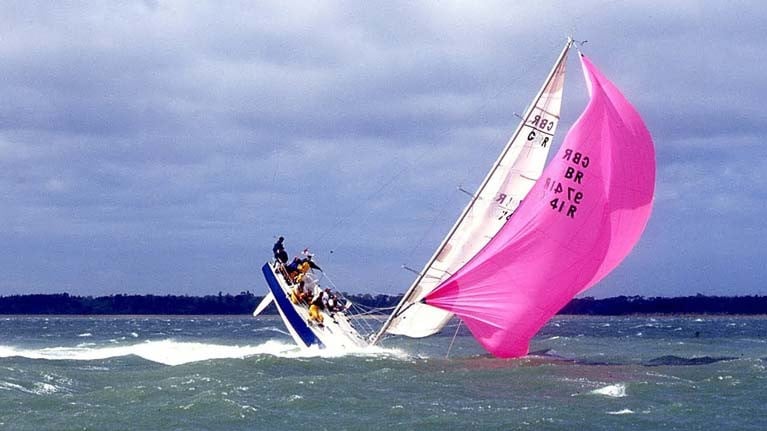When a country is brooding under the gloom of a developing and lethal global pandemic, you’d have thought that something mildly light-hearted such as the weekend’s Sailing on Saturday creation of a virtual launch party at the Royal Irish Yacht Club for Wicklow Sailing Club’s SSE Renewables Round Ireland Race 2020 might have helped to brighten the national mood, in however small a way.
But not everyone agreed. Indeed, some made it clear in private communications that this wouldn’t do at all. The cancellation and its implications were apparently a very serious business and should be treated as such. We couldn’t help but be reminded of Liverpool manager Bill Shankly’s reply - when asked if football was as important as life and death - that in fact, the beautiful game was much more important than life and death.
In Ireland in particular, you make jokes about sport at your peril. For sure, proven fellow participants can make jokes about individual sportsmen’s predicaments, and our header photo has been a happy hunting ground for sometimes savagely droll peer comment. But as for making jokes about sport for a general readership – that is totally verboten.
We were reminded of this back in the day when we used to write a weekly newspaper column about sailing when Ireland was covered in newsprint. An American acquaintance from San Francisco commented that although his home town was served by no less than three reputable daily newspapers and the Greater Bay Area was full of sailing and power boats, not one of the city’s three newspapers carried a regular sailing column.
Yet in Ireland by contrast, people seemed to take their sporting journalism very seriously indeed - however much of a minority interest was being covered - and every national newspaper had a regular sailing column, summer and winter.
Thus it came about that when headline-grabbing stories about the use of performance-enhancing drugs in sports as various as swimming and cycling and distance running were dominating the sports news, I popped in a column about how sailing also shared this problem. The use of performance-enhancing drugs was rife in Irish sailing, and I could prove it.
This caused quite a flurry in the sports pages sub-editing sweatshop, where they were thinking about making it the lead story. But a reference to the paper’s on-call libel lawyer calmed them down. He pointed out that the performance-enhancing drugs in question were clearly discussed as being taken after the event.
These performance-enhancing drugs amounted to no more than the usual heap of pints which crews consumed in the club after racing (for this was a very long time ago), as a result of which a boat and crew which had turned in a mediocre performance gradually found, as the juices flowed, that they’d actually been more or less in the middle of the fleet. Only in sailing – and in Irish sailing at that – are performance-enhancing drugs taken after the event. And they’re used to such good effect that by the time our gallant matelots finally reeled homewards into the night and properly awash, they were fully convinced they’d been solidly in the frame.
So the column was used in its entirety, but believe it or not, it was given an editorial introduction to make sure that everyone realised it was trying to lighten the mood. For the editor well knew that dyed-in-the-wool sports fans regarded every blessed written word on all sorts of competition as Holy Writ, and you just didn’t make jokes - however feeble - about any sport in a general kind of way.
That said, because sailing does carry an element of danger, there’s a tendency within the sport to a certain amount of gallows humour about the predicaments of others. It can be dependent on cultural background. Up on Belfast Lough, the tone seems still to be set by the rugged nature of working in the shipyard, where the foremen were wont to wear bowler hats. This wasn’t vanity. It was because a particularly demanding foreman would know that anyone with a grievance against him might well - when working at a height - accidentally drop a large rivet aimed right at his head as he strode along at ground level.
 The rough tough world of ultimate ship-building as the Titanic nears completion in Belfast. The bowler hats of the bosses were more than ornamental indications of rank, they were vital personal protection
The rough tough world of ultimate ship-building as the Titanic nears completion in Belfast. The bowler hats of the bosses were more than ornamental indications of rank, they were vital personal protection
Consequently, the bowler hat was actually a steel-reinforced crash helmet for protection against personal and ever-present danger. In such a social climate, anyone making a mistake was quickly singled out for cruel derision, both in work and at play. Thus in some Belfast Lough sailing events nowadays, it’s still regarded as hilarious to honour some unfortunate mistake-maker after each day’s racing for acclamation as “The Mug of the Day”.
Each to their own and welcome to it, as you might say. In these surreal times, we can only conclude with some advice from a member of the Waterford sailing community as to how best to stock up for the Self-Isolation which many of us may have to resort to in order to get through the Covid-19 quarantine period.
Apparently the answer is to buy After Eight Mints and Carr’s Miniature Table Water Biscuits in industrial quantities. The word from Waterford is that, after you’ve been isolated, this will be the only nourishment that your family will be able to slide in under the door.
































































